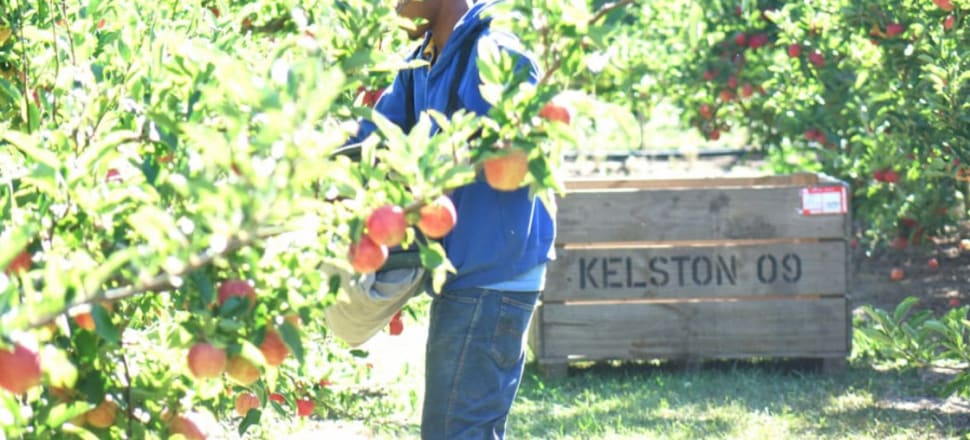
The urgent review of seasonal worker visa settings would benefit from a cemented emergency provision
Advocates would like permanent changes to the season worker scheme being urgently reviewed in the wake of Cyclone Gabrielle.
As it stands, Immigration Minister Michael Wood is taking advice on whether flexibility can be built into the seasonal worker scheme to allow workers to be redeployed to help with the cyclone clean-up, which could include work outside of the horticulture field.
He expects to report back in the next week or so after taking advice from officials.
READ MORE: * Hundreds of workers flown home to Pacific despite fishing firms’ pleas * Bulk of Hawkes Bay fruit growers’ crops uninsured * The case for an NZ Reconstruction Authority
Currently, workers on a recognised seasonal employer (RSE) visa can only work planting, maintaining, harvesting and packing crops for around seven months with an approved employer.
The East Coast regions hit hardest by Cyclone Gabrielle are RSE hot spots – with 3871 of New Zealand’s 9079 current seasonal workers located in Hawkes Bay. A further 654 are in the Bay of Plenty and 179 are in Gisborne.
For some workers, the orchards they were assigned to have been wiped out. However, although maintaining the orchard is approved under the scheme, they may be left without a full season of work to do – putting pressure on employers, who have to pay a minimum of 30 hours a week.
Getting to New Zealand in the first place can push seasonal workers into debt so leaving early isn’t the desired option for either party.
Speaking to Newsroom last week, Hawke's Bay Fruit Growers Association president Brydon Nisbet said the Government needed to look at changing immigration policy so teams of RSE workers could be shared between employers as needed.
“The policy needs to change a little bit [so] that they can be shared around in groups and used just to help clean up and do whatever, because they want to stay and keep working.”
Another option for visa flexibility is duration, allowing workers to extend their stay for as long as clean-up work exists.
Tanya Pouwhare, chief executive of New Zealand Ethical Employers, which works to improve human rights in primary industries, said having to invoke Covid powers to change RSE settings during the pandemic, and then the review following the cyclone showed visa settings may not have been fit for purpose in extreme circumstances.
“Hopefully immigration take that into account during the RSE policy review and say, 'Well, we had to get Covid powers to change them last time and now we're having to go through this big process to get this flexibility written in'.
“We need to have something written into the policy for future-proofing for when things like this occur.”
As well as filling necessary roles, the change would provide certainty to workers after a national emergency.
Rights
Any change would need to protect the workers' rights.
“They've made a commitment to moving and leaving their families and friends and coming to New Zealand and to do a specific job with conditions around payment and hours," said Pouwhare.
“If that job changes at all, then there needs to be the normal employment conversation and process that needs to take place which is happening, so no one has been made to do anything that they don't want to do and due process is followed.”
Changing the job of seasonal workers has been a pressure point for businesses in the past.
In 2022, Sealord and Talley's wrote to then-immigration minister Kris Faafoi seeking to hire some of the 200 to 500 RSE workers with time left on their visas at the end of the Nelson and Marlborough fruit-picking season.
Instead of addressing a labour shortage during the hoki season, the workers were sent home because the visa was for fruit-picking.
Faafoi acknowledged redeploying the workers to the seafood sector would have met a short-term labour need, but said it was appropriate to assess both the sector's ability to participate in a Pacific programme and Pacific governments' interest in such a programme before any steps were taken.
The ability is a major factor. Alongside pay commitments, RSE employers also need to provide accommodation and pastoral care to workers.
Business as usual
Some rough estimates place total damage to crops in Hawkes Bay at around 25 percent, so for the majority of RSE workers in the affected regions it is business as usual and harvest is going ahead.
Thornhill Horticultural Contracting, a major employer of both New Zealander labourers and seasonal workers in Hawkes Bay, had to delay 120 workers set to come into the country after the cyclone.
Thornhill general manager Nick Bibby said there was plenty of work going on for his workers, “We're pretty well-focused on harvest rather than clean-up; there's still apples out there to be harvested. So I think those [clean-up] types of jobs will come later.”
Nevertheless he said immigration had been proactive in discussions about flexibility in visas around job descriptions, but also in timing for visas of those delayed workers.
“They'll now come for winter as opposed to summer and stay longer at the other end. So immigration has been really proactive in working with us to give some flexibility to make the business decisions that we need to make.”







